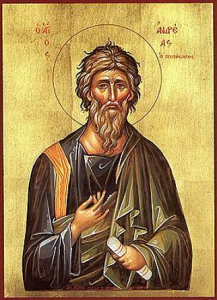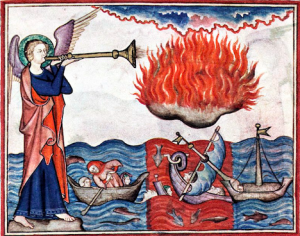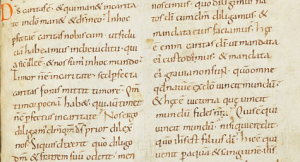There’s Something About Andy
2024 is upon us, and I don’t mean five weeks from now—I mean this weekend. The Catholic liturgical year begins on the First Sunday of Advent (which puts it about a month ahead of the civic new year). Christmas commemorates the terrestrial beginning of the life of Christ, and thus of the Church in “embryonic” form; the ritual year accordingly begins with the preparation for this solemnity, which is the season of Advent. Unless you’re in the Archdiocese of Milan,1 the season consists in the four Sundays preceding Christmas, and therefore varies slightly in length, from a minimum of twenty-two days to a maximum of twenty-eight, and the beginning of Advent is whatever Sunday falls on or nearest to 30 November (the Sunday of the week 27 November to 3 December).
This also happens to be the Feast of St. Andrew the Apostle, the brother of Simon Peter. Once in a while, this means that St. Andrew gets remembered twice in a single liturgical year!3 Here’s how it works. Normally, when Advent starts on its earliest possible date in one year, it starts on the latest possible date the next (unless a leap year comes in to muck up the maths). These are the starting dates for Advent in liturgical years 2023 and 2024. The upshot of this is that 30 November 2022 fell after liturgical year 2023 had begun, but 30 November 2023 falls before the start of liturgical year 2024—so we’re (almost) beginning and ending liturgical 2023 with the Feast of St. Andrew.

A late 20th century Greek ikon, bearing the legend
ὁ Ἀπόστολος Ἀνδρέας Πρωτόκλητος [ho Apostolos
Andreas Prōtoklētos], “the Apostle Andrew the First-called.”
There is a certain fittingness in beginning the liturgical year with this apostle. We aren’t told much about St. Andrew in the Gospels. Matthew presents him being called from the family’s fishing nets along with his brother, and as accompanying the Big Three (Peter, James “the Greater,”4 and John) in asking about Jesus’ prophecy of the destruction of Jerusalem and hearing the Olivet Discourse of chapters 24-25; Mark and Luke give us similar information, though a bit less of it.
The Fourth Gospel, as so often, is the juiciest. It informs us in chapter 1 that Andrew was already a disciple of St. John the Baptist, that he began following Jesus at the Baptist’s behest, and that he promptly went to his brother to tell him they had found the Messiah. (Especially since Peter doesn’t seem to react in John, this may have been his first encounter with Jesus, before the episode related in Luke 5, at which point Peter is apparently familiar enough with Jesus to agree to do him a frankly ridiculous favor5). In chapter 6, it specifies that Andrew is the one who brought attention to the boy with the five loaves6 and two fish, out of which Jesus fed the five thousand. And in chapter 12, when “certain Greeks” approached Philip asking to be introduced to this intriguing rabbi, Philip goes to tell Andrew, and then they both approach Jesus. (Interestingly, Philip and Andrew are the only two out of the Twelve who are only named in Greek, never Aramaic or Hebrew, suggesting they were given Greek names.7 This may be why these “Greeks,” probably Gentile “God-fearers” but possibly Jews from further west in the Mediterranean, approached them.) In other words, every time we see Andrew in John, he is bringing someone to Jesus.
RSV-CE
The Epistle of St. Paul to the Romans, 10:9-18.
Because, if you confess with your lips that Jesus is Lord and believe in your heart that God raised him from the dead, you will be saved. For man believes with his heart and so is justified, and he confesses with his lips and so is saved. The scripture says, “No one who believes in him will be put to shame.” For there is no distinction between Jew and Greek; the same Lord is Lord of all and bestows his riches upon all who call upon him. For, “every one who calls upon the name of the Lord will be saved.”
But how are men to call upon him in whom they have not believed? And how are they to believe in him of whom they have never heard? And how are they to hear without a preacher? And how can men preach unless they are sent? As it is written, “How beautiful are the feet of those who preach good news!” But they have not all heeded the gospel; for Isaiah says, “Lord, who has believed what he has heard from us?” So faith comes from what is heard, and what is heard comes by the preaching of Christ. But I ask, have they not heard? Indeed they have; for “Their voice has gone out to all the earth, and their words to the ends of the world.”
The angel of the second trumpet (Rev. 8:8-9).
Illumination from the Cloisters Apocalypse,
created in Normandy ca. 1330.
My translation
A Letter From Paul to the Congregation in Rome, 10:9-18.
Because if you consent with your mouth that Jesus is Lord and believe with your heart that God roused him from the dead, you will be saved; for with the heart one believes (and thus, justice), and with the mouth one consents (and thus, salvation). For the writing says: “All who believe in him will not be shamed.” There is no separation between Jews and Greeks; he is the same Lord of riches to all who call upon him. For “all who will call upon the name of the Lord will be saved.”
Even so, how will they call on one whom they do not believe in? Or how will they believe when they have not heard of him? Or how will they hear about him except by a herald? Or how will heralds go unless they are sent? Just as it is written: “How fair are the feet of those who bring good news.” But not all listened to the good news; for Isaiah says, “Lord, who believed what we heard?” Therefore, belief is from hearing, and hearing is through the message of Christ. But I say: didn’t they hear? On the contrary, “To the whole earth has their voice gone out, and to the ends of the world their message also.”
Readers may notice that the differences between my translation and the RSV’s are a lot less marked in this passage than they were in the Gospel passage from this past Sunday! There tends to be more “smoothing out” in some books than others, depending on the quality of their Greek—Mark and Revelation have the roughest Greek of the New Testament, while Luke’s is the best, and Paul’s is fairly good.
Despite being a short and not particularly complicated text, there are a couple tricky points here that I want to highlight.
Note 1: Δικαιοσύνη
First is the word δικαιοσύνη [dikaiosünē]: the RSV-CE here renders it “is justified,” while I have translated it “justice”; “righteousness” is another common choice. I find most translations of this term unsatisfying, my own included. This is not because it is an inherently unfamiliar concept; despite popular garblings of the Sapir-Whorf hypothesis, that kind of difficulty in translation is actually not very common. Δικαιοσύνη does simply mean “justice” or “just-ness,” i.e. the quality of character (as opposed to the abstract thing we’re talking about when, e.g., we say that a litigant has “obtained justice,” which is obviously different). The trouble is that, nowadays, it isn’t a concept we’re much in the habit of using. We don’t often describe people as righteous, skater lingo notwithstanding—not because it’s too “low” (an irrelevant concern), but because it really doesn’t mean the same thing when a skater says it that it meant when an eighteenth-century homilist said it.
Probably the closest equivalent in normal English is when we say someone has integrity; honest might serve as a distant next-closest. The trouble with translating δικαιοσύνη as “integrity” is that, first, integrity is a little vague in English—I mean, its most popular definition is the proverb Integrity is what you do when nobody’s looking, which is great as a proverb but rather unhelpful from a linguistic point of view.
And second, integrity does not relate to many other words in English the way δικαιοσύνη does in Greek. The word is derived from an adjective (δίκαιος [dikaios]), which is itself derived from a noun (δίκη [dikē]), that also yields a verb (δικαιόω [dikaioō]); these respectively mean just, justice (the abstraction), and justify. If you trace the same set of derivations from integrity, you get integral, integer, and integrate—not a very close analogue! Given that I aim for literal renderings, I normally try to preserve the linguistic relationships between terms if it’s feasible, which obviously isn’t possible if I translate δικαιοσύνη as “integrity.”
As far as linguistic reasons go, translating it as “honesty” is even worse (partly because, while there is the noun, there’s no verb derived from the adjective honest). And besides that, honest is really a little too narrow; δικαιοσύνη meant something broader, of which honesty would only form one part. So, despite sounding a little strange in an otherwise-colloquial passage, justice does turn out to be about the best option available.

Note 2: εἰς
This second note will start off sounding truly ridiculous, but I promise I have a point. Those of you who are fond of learning about prefixes—aren’t our kind the life of the party?—may already have recognized that εἰς [eis] is a Greek preposition, and simply means into. This might not seem like the kind of word about which much of interest can be said! And this second note is less weighty than the first, yes. But I think it’s worth taking, uh, note of.
The problem phrases are those which the RSV-CE translates “and so is justified” and “and so is saved,” but which I have instead rendered “and thus, justice” and “and thus, salvation.” The issue I take with the RSV translation is that the Greek doesn’t have verbs here, passive or otherwise; it has noun phrases: εἰς δικαιοσύνην [eis dikaiosünēn] and εἰς σωτηρίαν [eis sōtērian], literally “into justice” and “into salvation.” I was tempted to translate these phrases as “one believes one’s way into justice” and “one consents one’s way into salvation”; I ultimately decided that inserting the noun phrase one’s way was a little too free, but there’s a case to be made for it, I think. I also considered using unto, which captures the meaning of εἰς rather nicely in this context, but it seemed too archaic.
I eventually decided on rendering εἰς as “and thus” because it seemed to capture both the relationship the preposition indicates and the oddly elliptical, even vague, wording of St. Paul here. The RSV-CE, like most Bibles, makes the phrase quite definite in English. Personally, I dislike that kind of thing in a translation; if the original is cryptic, isn’t that part of the text, just as much as a play on words? Resolving vagueness that is original to the material is an interpretive choice, not a translation choice. Of course, interpretation of meaning is intimately related to translation of words, and translators are obliged sometimes to not only translate but interpret; that’s just how language is. But if the two tasks can be kept distinct, I think they ought to be, and I think they can here.
Footnotes
1The Archdiocese of Milan uses the Ambrosian Rite (named after its designer, St. Ambrose, who baptized St. Augustine). It is similar to the Roman Rite, but there are some notable differences, chiefly in the prayers of the Mass, the lectionary cycle, and the liturgy of the hours.2 The relevant difference here is that instead of four Sundays, Advent in the Ambrosian Rite has six, placing the beginning of Advent on the Sunday from 13 to 19 November.
2The Liturgy of the Hours or Divine Office is the daily prayer of the Church, similar to the tefillot or davening of Judaic practice and derived in part from the same origins. Each ritual Hour consists mainly in psalms, readings from Scripture, and a few set prayers; the Hours take different forms in different rites, but there is a common “backbone” of seven offices in the Assyrian, Catholic, Miaphysite, and Orthodox traditions (which was simplified to the two offices of Mattins and Evensong in the Anglican). Priests and religious are the only groups normally duty-bound to say the Office, though many laymen do as well.
3I got confused trying to work out the exact frequency of this on my own! Of course Google was no help, because it never is any more, so I can’t tell you exactly how common this is; I think it works out to less than a fifth of the time, but more than a seventh—thanks to the weird interplay of weekdays receding by one date every year, but by two dates every four years, due to the leap day. (My next guess, based on my hunch that I’ve got the fractions upside down, would be that it happens rather less than one-seventh of the time.)
4“The Greater” probably means that he was the older of the two Apostles named James, though it could mean that he was the taller. This is not James “the brother of Jesus,” a.k.a. “the Just,” who was the author of the Biblical epistle and the first Bishop of Jerusalem; this St. James the Less is generally identified with James bar Alphæus (bar is the Aramaic for “son; son of,” like mac in Gaelic). St. James the Greater, on the other hand, is James bar Zebedee, John’s brother. These two were the pair Christ nicknamed the “Sons of Thunder,” Βοανηργές [Boanērges]—another ambiguous moniker. It might mean Zebedee’s sons had exceptionally deep or loud or rumbling voices; it might be a metaphor for a “thunderous” style they both had (which fits in with the Apocalypse at least); or it could indicate their impetuosity. This is, first of all, the pair who not only asked to sit at the Lord’s right and left hand in the Kingdom—which I have a shrewd hunch will turn out to be the case, because it’s just the sort of prank God pulls on his children!—but did so on the heels of an especially pointed parable and a foretelling of the Passion. And second (I again recommend glancing at the broader context of the chapter to get the full gut-punch here), these brothers responded to the un-hospitable attitude of a Samaritan village by asking their Master, bold as brass, if he’d like them to burn it to the ground. So, probably SS. James the Greater and John showed a certain amount of ‘tude.
5I.e., letting down his nets for a catch in the middle of the day; when using nets (the only way to make an actual living from fishing), working at night was preferable, since during the day the sunlight enabled even creatures as stupid as fish to simply swim around or away from the nets. Peter’s aggravated reply—Master, we have toiled all the night, and have taken nothing: nevertheless at thy word I will let down the net—is a marginally more respectful equivalent of “Fine, but this is not how fishing works.”
6Specifically, John mentions they were barley loaves—the coarser and less tasty local variety of bread, usually the fare of the poor; the well-to-do preferred wheat bread.
7Contrary to widespread belief, Greek was a mother-tongue in the area at the time, and not only among Gentiles. Aramaic was more common, but Greek-speaking Jews did live in the Holy Land, especially in northern regions like Galilee; popular Greek names like Andreas [Ἀνδρέας] and Philippos [Φίλιππος] were accordingly familiar among Jews. (The Hebrew and Grecian or Hellenist ethnic factions of the primitive Church in Acts 6 probably refers to native tongue—”Hebrew” often refers to Aramaic in the New Testament. Aramaic is related to Hebrew, in such a way that calling it “Hebrew” would be a little bit like referring to a modern Romance language as “Latin.”)















